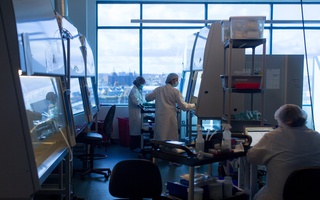The word “antibiotic” might soon be meaningless, according to a study by Harvard Medical School geneticists.
The researchers found that some forms of bacteria found in soil are not killed by antibiotics, and can in some cases actually use them for nourishment.
The authors of the study said that they stumbled upon the unusual antibiotic-eating bacteria by chance.
“We were interested in producing bio-fuels from agricultural waste,” said George M. Church, a Medical School professor and one of the authors of the study, which was published in the journal Science.
While looking for bacteria living in the soil that could remove toxins from cellulose and other decaying plant matter, the researchers used antibiotics as an experimental control and discovered that many strains of bacteria were able to survive on antibiotics as their sole source of carbon.
“We sat back and thought, ‘Is this a fluke, or is this something that is worth pursuing?’” said Gautam Dantas, a Medical School professor and another author of the study. “Luckily, we decided to do the second.” [SEE CORRECTION BELOW]
The researchers tested a diverse class of 18 antibiotics and found that most could sustain bacteria from 11 different types of soils.
“Any high school kid could do this experiment,” Church said, “but there wasn’t a lot of literature on it. We realized people don’t normally culture bacteria this way.”
A representative subset of these bacterial strains were then tested for antibiotic resistance, and many showed resistance to both clinical doses of antibiotics as well as doses 50 times larger, Dantas said.
Kim Lewis, a professor of biology at Northeastern, said that the underlying hypothesis of this paper suggests that the properties of soil bacteria that allow them to grow on antibiotics also allow them to resist antibiotics in more complex environments, like in an organism.
The study indicates that humans should be careful about toxins that are added into the soil—like the antibiotics given to agricultural livestock—because some of the bacteria could become increasingly resistant to antibiotic therapies.
“Antibiotics used in agriculture can improve productivity of food animals, but at what risk?” Dantas said. “Are we annulling our only chemotherapeutic treatment against infectious disease because we want to keep our meat?”
The study also found that many of these soil bacteria are closely related to human pathogens.
Church said follow-up studies should determine which genes control this “super-resistance” and if humans contain bacteria with similar genetic makeups.
If the super-resistant soil bacteria are exchanging genetic information with human pathogens, antibiotics might become counterproductive as a treatment because these bacteria might simply consume the antibiotics and use them to grow.
“We’re trying to encourage people to follow up on this and not keep it to ourselves,” Church said.
—Staff writer Alissa M. D’Gama can be reached at adgama@fas.harvard.edu.
For recent research, faculty profiles, and a look at the issues facing Harvard scientists, check out The Crimson's science page.
CORRECTION
The April 18 story, "Some Bacteria Eat Antibiotics," misstated the title of Gautam Dantas. He is a research fellow at Harvard Medical School, not a professor.
Read more in News
Slavery Ties Left UnexploredRecommended Articles
-
Study Says Antibiotics Over-PrescribedAlmost half of all infections caused by a bacteria responsible for pneumonia, meningitis and ear infections will be virtually untreatable
-
Study Says Meds Over-PrescribedAlthough members of the medical community have struggled in recent years to reduce unnecessary antibiotic prescription, a study released yesterday
-
Memo to VilsackCongratulations, Thomas Vilsack, on your recent appointment as America’s new Secretary of Agriculture. As you leave Harvard’s Institute of Politics
-
Antibiotics Overprescribed, Research FindsGot a sore throat? Your doctor might prescribe you antibiotics. They help right? According to a new Harvard study, the answer is not always.
-
 Give a Shit
Give a Shit













